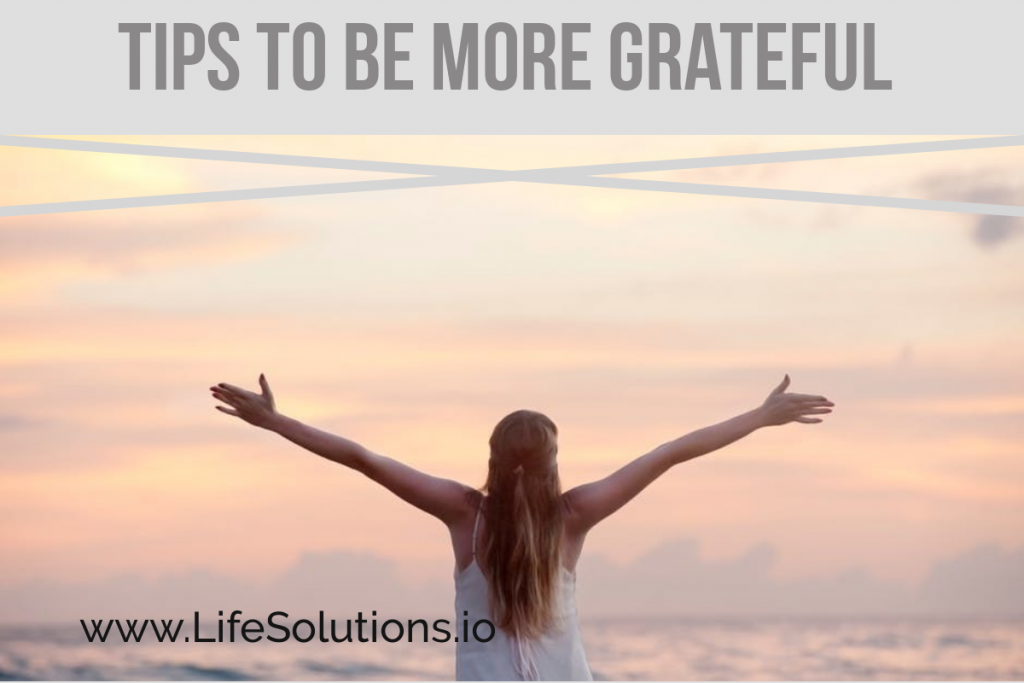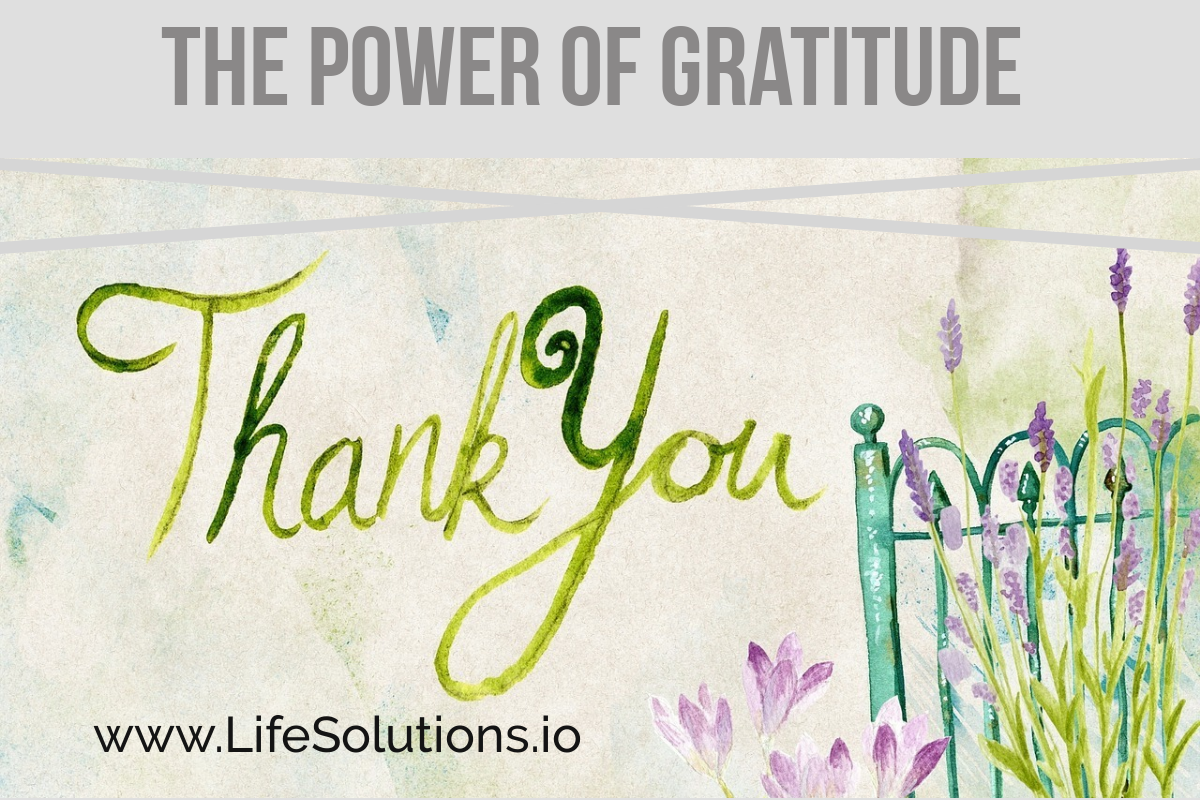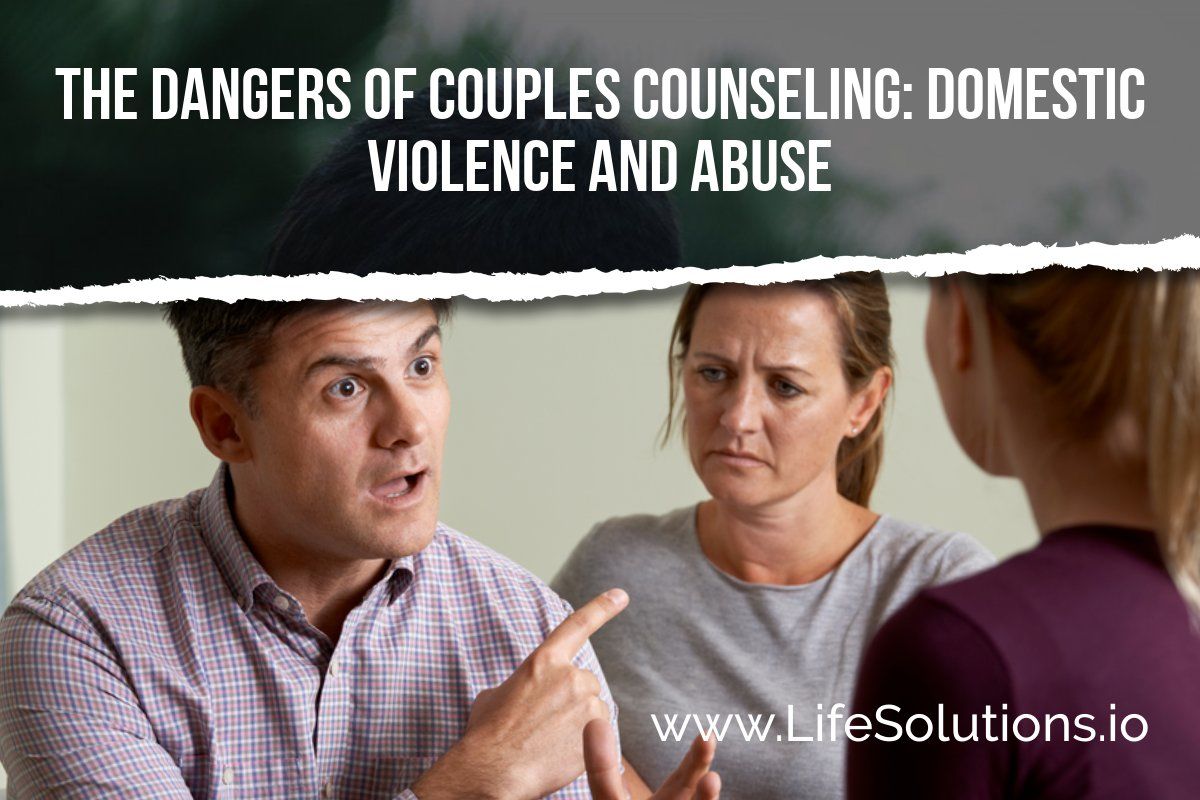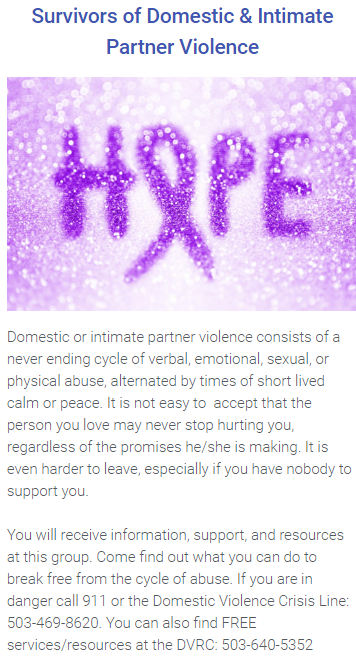Robert Emmons, a leading expert on gratitude, says that gratitude has two important parts: “First, we affirm that there are good things in this world. And second, we realize that the source of the goodness is outside ourselves, which allows us to see how we’ve been supported and affirmed by other people.”
Gratitude: Your Powerful Tool For Change and Health
Gratitude may be one of the most overlooked tools that we all have access to every day. According to research even practicing gratitude for a short amount of time can lead to higher levels of well-being. Cultivating gratitude has enormous benefits in the following areas of our lives:
Gratitude Increases Mental Health
- Gratitude reduces stress: Gratitude and other positive emotions are among the strongest relaxants known to man. Gratitude may be just as or even more effective than relaxation methods such as deep breathing.
- Gratitude helps overcome trauma. A 2006 study published in Behavior Research and Therapy found that Vietnam War Veterans with higher levels of gratitude experienced lower rates of PTSD. Gratitude has also been shown to lead to positive outcomes following traumatic events such as campus shootings (Vieselmeyer, 2017: The Role of Resilience and Gratitude in Posttraumatic Stress and Growth Following a Campus Shooting) or destructive earthquakes (Lies, 2014: Gratitude and personal functioning among earthquake survivors in Indonesia), as well as following negative life experiences such as substance misuse (Chen, 2017: Does gratitude promote recovery from substance misuse?)
- Gratitude improves psychological health. Gratitude reduces a multitude of toxic emotions, ranging from envy and resentment to frustration and regret. Robert A. Emmons, Ph.D., a leading gratitude researcher, has conducted multiple studies on the link between gratitude and well-being. His research confirms that gratitude effectively increases happiness and reduces depression. Recent studies also showed that gratitude decreased levels of depression (Sirois, 2017: Gratitude Uniquely Predicts Lower Depression in Chronic Illness Populations) while others point to the higher levels of well-being in people who practice gratitude (Nezlek, 2017: A daily diary study of relationships between feelings of gratitude and well-being)
- Gratitude builds resilience: Some people experience profound life losses yet find themselves capable of moving forward and finding happiness again. They find the people and passions in their lives that make them happy and focus on them. A 2003 study published in the Journal of Personality and Social Psychology found that gratitude was a major contributor to resilience following the terrorist attacks on September 11. Recognizing all you have to be thankful for, even during the worst times of your life, fosters resilience.
Gratitude Promotes Physical Health
- Research shows that those who engage in gratitude practices feel less pain, go to the doctor less often, have lower blood pressure, and are less likely to develop a mental disorder. (2012 study published in Personality and Individual Differences). Grateful people tend to exercise more, take better care of their health, go for check-ups frequently. Grateful people tend to cope and manage terminal conditions better and recover from certain medical procedures faster.
- Grateful people sleep better. In a 2011 study in Applied Psychology: Health and Well-Being found that writing in a gratitude journal improves sleep and helps with insomnia. This is a matter of controlling our minds and instead of filling it with worries or anxiety; we fill it with thoughts of gratitude which induces a relaxation response. Simply put, gratitude is a safe and free sleep aid (Jackowska, 2016: The impact of a brief gratitude intervention on subjective well-being, biology and sleep)
- Gratitude makes you more likely to exercise, which benefits your health. In one 11-week study of 96 Americans, those who were instructed to keep a weekly gratitude journal exercised 40 minutes more per week than the control group.
- The optimist actually lives a few years longer than the pessimist. In fact, research shows that gratitude and vitality are strongly correlated (A study of 238 people found a correlation of .46 between vitality and gratitude.e2Study of 1662 people found a correlation of .38 between vitality and gratitude. Same study found correlations above .3 even after controlling for the levels of: extroversion, agreeableness, neuroticism, and perceived social desirability
Gratitude Can Change Your Personality
- More Optimistic: Writing in a gratitude journal for 5 minutes a day can make us more optimistic. Optimism in turn makes us happier, improves our health, and has been shown to increase lifespan by as much as a few years.
- Less Materialistic: “Be thankful for what you have; you’ll end up having more. If you concentrate on what you don’t have, you will never, ever have enough.” Oprah Winfrey
Gratitude and materialism are inversely related. In one study, (McCullough 2002) those who had a high level of gratitude as a personality trait were much more likely to have below-average levels of materialism. Polak 2005 showed the same results. Lerner and Ketlner (2000, 2001) show that gratitude focuses our attention on others (which makes us less self-centered) - More Spiritual: That is more spiritual people are the more likely they are to be grateful seeing that all major religions espouse gratitude as a virtue. In turn gratefulness improves our spirituality and makes us feel closer to God or other religious entities
- Less Self-Centered: The very nature of gratitude is to focus on others so when we practice gratitude we also develop spontaneous urges to help others, and cause us to be less self-centered.
Gratitude Edifies Emotional Health
- Gratitude enhances empathy and reduces aggression: According to a 2012 study by the University of Kentucky participants who ranked higher on gratitude, were less likely to retaliate against others, even when given negative feedback. They experienced more sensitivity and empathy toward other people and a decreased desire to seek revenge.
- Gratitude improves self-esteem: A 2014 study published in the Journal of Applied Sports Psychology found that gratitude increased athlete’s self-esteem, which is an essential component to optimal performance. Other studies have shown that gratitude reduces social comparisons. Rather than becoming resentful toward people who have more money or better jobs grateful people are able to appreciate other people’s accomplishments.
- Gratitude makes us feel good: According to gratitude researcher Robert Emmons, gratitude is just happiness that we recognize after-the-fact to have been caused by the kindness of others. Gratitude feels good, make you stronger, healthier, and more successful. By giving it to others, you increase your own supply. As J.M. Barrie said, “Those who spread sunshine to the hearts of others cannot keep it from themselves.”
- Gratitude reduces feelings of envy: Envy and gratitude are largely incompatible. Gratitude is the act of perceiving benevolence, while envy and jealousy is the act of perceiving inadequacy. Benevolence and inadequacy cannot be completely perceived at the same time.
- Gratitude makes our memories happier: Experiencing gratitude in the present makes us more likely to remember positive memories, and actually transforms some of our neutral or even negative memories into positive ones. In one study, putting people into a grateful mood helped them find closure of upsetting open memories. During these experiences, participants were more likely to recall positive aspects of the memory than usual, and some of the negative and neutral aspects were transformed into positives.
Gratitude Spices Up Your Social Life
- Gratitude opens the door to more relationships. A 2104 study published in Emotion found that showing appreciation to a new acquaintance increases the chances of them seeking an ongoing relationship, so it can help you win new friends. Gratitude generates social capital – in two studies with 243 total participants, those who were 10% more grateful than average had 17.5% more social capital. Simply put, gratitude makes us nicer, more trusting, more social, and more appreciative. A more recent study showed that gratitude makes strangers trust us more (Drążkowski, 2017: Gratitude pays: A weekly gratitude intervention influences monetary decisions, physiological responses, and emotional experiences during a trust-related social interaction)
- Gratitude improves marriages: Building regular practices of gratitude into a marriage is an easy but effective way to strengthen it. Scientists created an appreciation to nagging ratio (called the Losada ratio) which divides the total number of positive expressions (support, encouragement, and appreciation) made during a typical interaction by the number of negative expressions (disapproval, sarcasm, and cynicism). Marriages that did well were those with a positivity ratio above 5.1, but when the ratio was below .9 the marriages were in trouble.
Gratitude Can Make or Break Your Career
Gratitude can help you achieve your career goals because it makes you a more effective manager, helps you network, increases your decision-making capabilities, increases your productivity, and helps you get mentors and protégés.

3 Easy Tips to Become More Grateful
Gratitude is like most desirable traits and qualities in that it is usually not enough to simply decide to be grateful, we must actively practice it. And keep track of, or we lose our grasp on it. Below are some practical applications to keep gratitude alive:
Gratitude journal:
A five-minute a daily gratitude journal can increase your long-term well-being by more than 10 percent on a daily level. Your gratitude journal or log is a personal endeavor that must be unique to you and your life. Below are some ideas to getting started:
- Write about a person in your life that you’re especially grateful for and why.
- What skills or abilities are you thankful to have
- Which part of a challenge you’re experiencing right now can you be thankful for?
- What activities and hobbies would you miss if you were unable to do them?
- List five body parts that you’re grateful for and why
- What about the city you live in are you grateful for?
- What are you taking for granted about your day to day that you can be thankful for?
- List 5 people in your life who are hard to get along with—and write down at least one quality for each that you are grateful for.
- What materialistic items are you most grateful for?
- Write about the music you’re thankful to be able to listen to and why.
- What foods or meals are you most thankful for?
- What elements of nature are you grateful for and why?
- What part of your morning routine are you most thankful for?
- Write a letter to someone who has positively impacted your life, however big or small.
- What is something you’re grateful to have learned this week?
- When was the last time you laughed uncontrollably—relive the memory?
- What aspects of your work environment are you thankful for?
Gratitude Meditation:
Many Buddhist monks and Native American elders begin their days and ceremonies with gratitude meditation. One study (Rao, 2016: Online Training in Specific Meditation Practices Improves Gratitude, Well-Being, Self-Compassion, and Confidence in Providing Compassionate Care Among Health Professionals) found that practicing gratitude meditation just once can instantly increase our feelings of gratitude and reap the benefits. Anybody can incorporate this intervention into their lives with minimal cost and effort, making that finding extremely promising The Rao & Kemper (2016) study shows that teaching people gratitude meditation can be done very quickly and that it can be done online. This means that just about anyone in the world can quickly learn about gratitude and gratitude meditation and start using it to their own benefit.
Simply Say Thank You
- Thank a family member: We tend to forget to say “thank you” to the people we spend the most time with, but it’s one of the simplest and most effective ways to nurture those relationships.
- Thank a stranger: It’s often easier to thank strangers than family members and it increases chances for future connections.
- Write a good, old-fashioned thank-you note. Thank your recipient specifically, and speak from the heart. Your words will be cherished and the relationship will be strengthened.
- Give a small gift of appreciation that you leave on the recipient’s doorstep, in their mailbox, or at their desk at work.
- Pay it forward: Pass the kindness along to someone else instead of giving a gift or thanking the person directly.
- Thank God. If you already have a prayer or meditation time, be sure to express gratitude to God, to the universe, or to yourself during those times
Famous Gratitude Quotes:
As we express our gratitude, we must never forget that the highest appreciation is not to utter words but to live by them.” John F. Kennedy
“Reflect upon your present blessings, of which every man has plenty; not on your past misfortunes, of which all men have some.” Charles Dickens
“Rejoice always, pray without ceasing, give thanks in all circumstances; for this is the will of God in Christ Jesus for you.” 1Thess 12:16-18 (NIV)
“Let us rise up and be thankful, for if we didn’t learn a lot today, at least we learned a little, and if we didn’t learn a little, at least we didn’t get sick, and if we got sick, at least we didn’t die; so, let us all be thankful.” Buddha

Contact Us Today
Gratitude is a HOLISTIC tool that can benefit a person’s whole being. However, sometimes we need more help. If you are struggling with depression, anxiety, PTSD, trauma flashbacks, physical or emotional scars of abuse, or any other debilitating issue, you probably need more help. Contact Heleen today at Life Solutions Counseling. She is a national counselor who is also trained in EMDR, an evidenced based treatment for trauma and PTSD. Don’t suffer alone any longer, contact us today.





